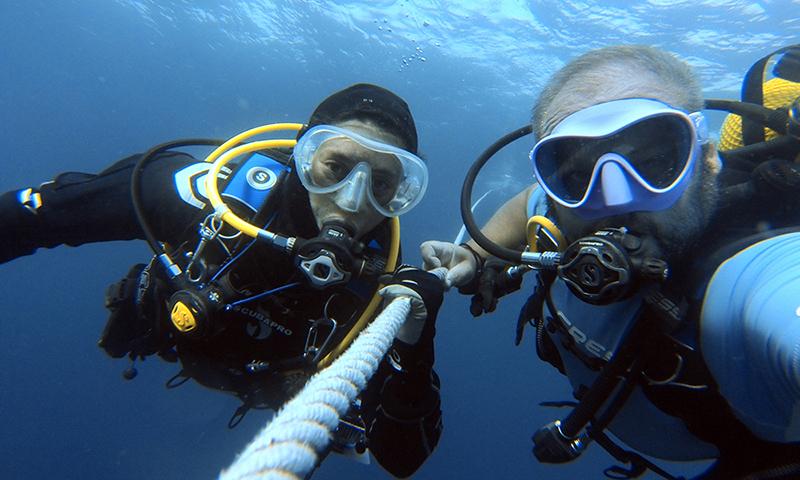Introduction
The European Commission enforces State aid rules to make sure that the support EU governments grant to companies large and small does not give them an unfair advantage or tilt the playing field in the internal market. On March 19, 2020 – less than a week after the WHO had declared Europe a centre of the Covid-19 pandemic – the Commission approved a State aid Temporary Framework that made the rules more flexible for the companies that needed support because of the crisis caused by the outbreak. The outlook was uncertain in mid-March 2020, so the Temporary Framework was designed as a flexible instrument that would adjust to an evolving situation. Click here if you are interested to know more about the Temporary Framework and its amendments.
Isa
Isabel La Guardia and Raul Ibañez have been running Divers Cabo de Palos, a diving centre not far from Murcia in Spain, since 2016. They were getting ready for the upcoming season that would start over Easter, but on March 14, 2020 – when Spain went into lockdown – they had to supend all operations and close down.
Divers Cabo de Palos was a healthy business. They just needed financial support to stay afloat for the duration of the lockdown – as it were. The support came in the form of a loan with extremely good conditions part of the first Spanish umbrella scheme approved by the European Commission on April 2, 2020. We asked Isabel what happened next.
 Isabel La Guardia and Raul Ibañez Isabel La Guardia and Raul Ibañez diving off Cabo de Palos, Spain |
How has the support you received helped you during the crisis?In mid-March our inflow of revenues suddenly stopped. We could not even predict when we would re-open. So, we took out a loan that would help us keep our diving centre operational. The loan did not cover all the costs that were still running even if we had no customers, but we managed to survive until June 13, when we could resume our diving expeditions. How did you adapt to the new normal since the Murcia region gradually eased Covid-19 restrictions?We were allowed to re-open but we have to take precautions. Signs in our diving centre help our staff and customers keep a safe distance. On the boat, we swap protective masks and scuba masks. All the operations we have to perform on land after a dive take much longer. In practice, our business is running at two-thirds of capacity in the new normal. We are struggling, but we will not give up. We say that there is nothing safer than diving. We cannot hug on land, but we can – and do – hug when we dive because it is safe. |
|||||
Jan
On 3 April, 2020 the European Commission approved a €23 million Dutch scheme under the Temporary Framework; it was the first Covid-related State aid decision involving the Netherlands. As many elderly people and people in need of medical care had to stay home because of the pandemic, the Dutch government decided it would offer grants to health-care providers to help them care for patients at home and remotely, especially through e-health applications. We asked Jan Leunis de Beij, director of Omring, to help us gauge the impact on the ground of the Commission’s State aid control and of the subsidies granted by the Dutch government. Omring provides general healthcare, support and specialised nursing both at home and in residential-care locations in West Friesland, in the north of Holland and on the island of Texel.
 Jan Leunis de Beij Jan Leunis de Beij in his office in Hoorn, The Netherlands |
What difference has the Government subsidy made?We had to respond quickly to the crisis and it was vital that the funding was available to us in a very short time. Thanks to the subsidy, we could immediately give 80 to 100 tablet devices to our home-care patients, which allowed us to set up a video care and digital support system. Thanks to the equipment, we could even do remote measurements. Also, we noticed that many Covid-19 patients remain tired for a long time after they leave the hospital, so we used part of the funding to organise post-corona rehabilitation for them. Finally, the subsidy allowed us to hire the extra project and care staff we needed. How has the Covid-19 outbreak changed your home-care practice? How would you describe the future of home health care after the pandemic?We have reduced contacts with our patients by 20%, at the same time ensuring they receive the care they need. We have created two routes for home-care teams, separating those who cater for patients infected with the virus from the others. Looking further ahead – and independently from Covid-19 – we believe healthcare will increasingly be supported by ICT. The technology will allow us to move more patients from hospitals to their homes and monitor their health remotely. Home care will increasingly supplement first-line care by General Practitioners. These developments will ensure faster and better healthcare and will help us meet the needs of Europe’s ageing population. |
